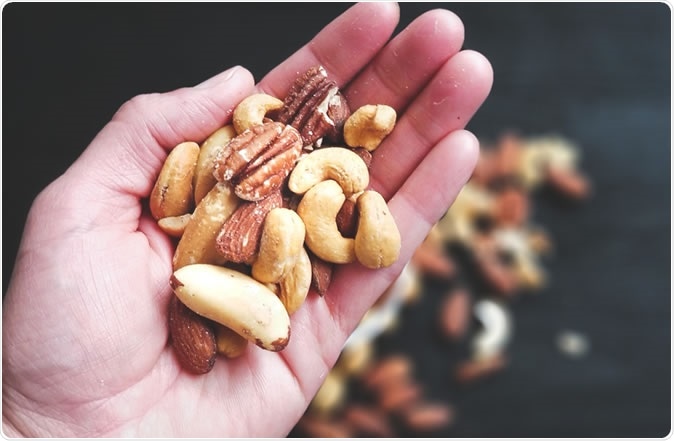Do you want to lose weight or slow down weight gain? You may want to eat more nuts.
Eating nuts has been tied to better weight management, particularly slowing down weight gain, according to a new study by researchers from the United States. The team of researchers want to determine the connection between changes in total consumption of nuts and long-term weight change.

Mixed nuts - Image Credit: Eakrat / Shutterstock
The study adds to a growing body of knowledge of the many health benefits of nuts, including preventing weight gain and warding off obesity, which is a growing public health concern worldwide. The World Health Organization (WHO) reports that in 2016, the number of obese people nearly tripled since 1975. There are about 1.9 billion people were overweight and a staggering 650 million were obese. It has reached epidemic proportions, with about 2.8 million deaths every year as a result of being overweight or obese.
Nuts wards off weight gain
The study, which was published in the British Medical Journal Nutrition, Prevention & Health, can help pave the way for another easy means to lose weight or prevent gaining too much weight. The researchers found that increasing the consumption of nuts by just half a serving or 14 grams a day is tied to less weight gain and a lower risk of obesity.
The researchers from Harvard Medical School examined data on weight, diet, and physical activity in three groups of people. The first group consists of male health professionals aged 40 to 75 years old, the second group involved nurses between 35 and 55 years old, and the last group were nurses who were between the ages of 24 and 44 years old.
The team asked the participants about their weight and how often they consumed a serving of nuts every four years. Meanwhile, the team also recorded the groups’ exercise every two years. The average weekly exercise of the participants included jogging, walking, cycling, swimming, gardening, and racquet sports.
The average annual weight gain in all groups was 0.32 kg or 0.71 lb. From 1986 to 2010, the total nut intake increased from a quarter to just below half a serving in a day for men, and from 0.15 to 0.31 servings per day among women.
They found that increasing nut intake is associated with less long-term weight gain and a reduced risk of becoming obese. In fact, those who ate more nuts, about 14 grams, had a lower risk of putting two or more kilograms over any four-year period.
“Increasing daily consumption of nuts is associated with less long-term weight gain and a lower risk of obesity in adults. Replacing 0.5 servings/day of less healthful foods with nuts may be a simple strategy to help prevent gradual long-term weight gain and obesity,” the researchers concluded in the study.
Nuts are healthy and filling
Nuts are rich in vitamins, fiber, minerals, and healthy unsaturated fats, which are often recommended for weight loss since they are calorie-dense.
This means that even with eating a few nuts, you may feel full and satiated. The researchers said that chewing nuts takes more effort that eating in a fast food, and the high fiber content in nuts make people feel fuller longer. Also, the fiber in nuts binds well to fat in the digestive tract, which means that more calories are excreted.
The researchers recommend substituting unhealthy foods, like fried foods, junk foods, and processed meats, to name a few, with half a serving of nuts. This is a simple and feasible way to ward off gradual weight gain, which is usually present when one grows old.
The study could add to the evidence that nuts have many health benefits, including warding off weight gain and promoting a healthy weight.
Journal reference:
Liu, X., Li, Y., Guasch-Ferre, M., Willett, W., Drouin-Chartier, J.P., Bhupathiraju, S., and Tobias, D. (2019). Changes in nut consumption influence long-term weight change in US men and women. BMJ Nutrition, Prevention, and Health. https://nutrition.bmj.com/content/early/2019/08/27/bmjnph-2019-000034